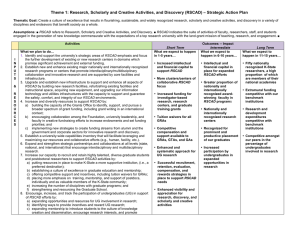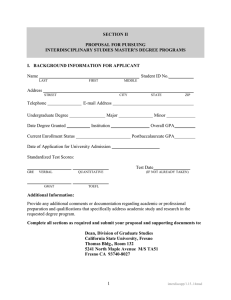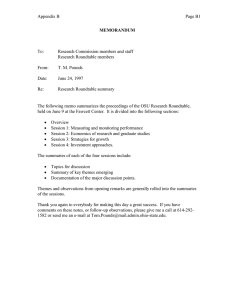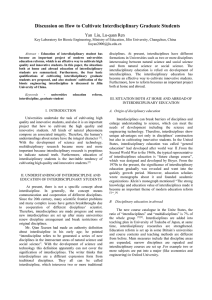STUDENT LEARNING OUTCOMES M.S. IN ENVIRONMENTAL SCIENCE/HEALTH
advertisement
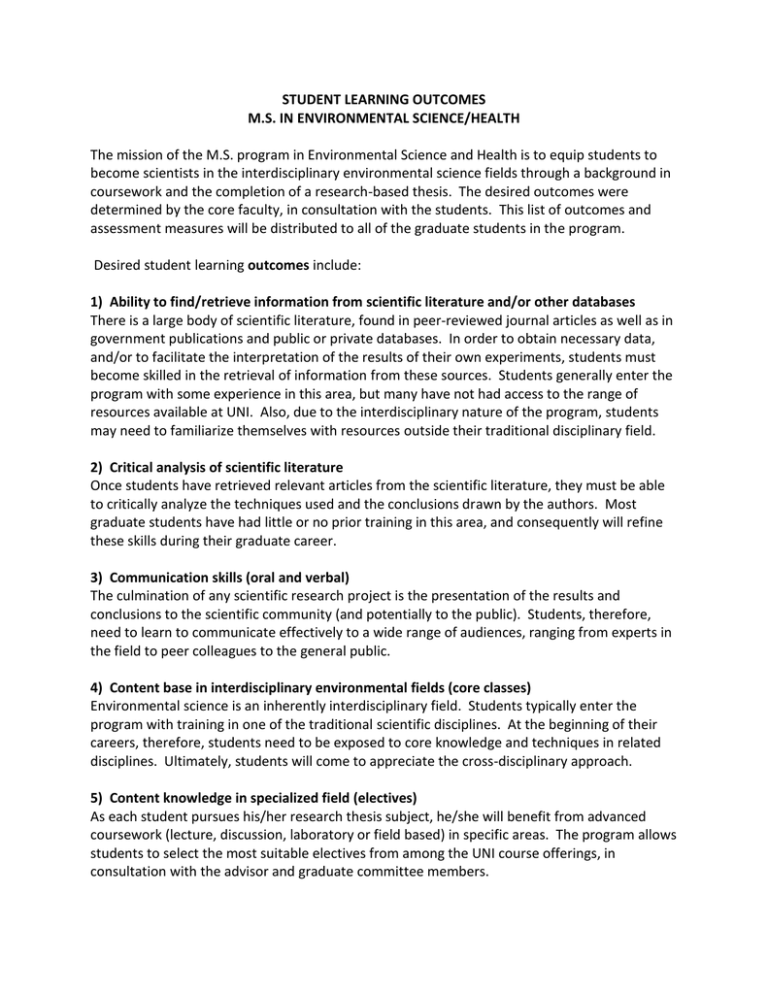
STUDENT LEARNING OUTCOMES M.S. IN ENVIRONMENTAL SCIENCE/HEALTH The mission of the M.S. program in Environmental Science and Health is to equip students to become scientists in the interdisciplinary environmental science fields through a background in coursework and the completion of a research-based thesis. The desired outcomes were determined by the core faculty, in consultation with the students. This list of outcomes and assessment measures will be distributed to all of the graduate students in the program. Desired student learning outcomes include: 1) Ability to find/retrieve information from scientific literature and/or other databases There is a large body of scientific literature, found in peer-reviewed journal articles as well as in government publications and public or private databases. In order to obtain necessary data, and/or to facilitate the interpretation of the results of their own experiments, students must become skilled in the retrieval of information from these sources. Students generally enter the program with some experience in this area, but many have not had access to the range of resources available at UNI. Also, due to the interdisciplinary nature of the program, students may need to familiarize themselves with resources outside their traditional disciplinary field. 2) Critical analysis of scientific literature Once students have retrieved relevant articles from the scientific literature, they must be able to critically analyze the techniques used and the conclusions drawn by the authors. Most graduate students have had little or no prior training in this area, and consequently will refine these skills during their graduate career. 3) Communication skills (oral and verbal) The culmination of any scientific research project is the presentation of the results and conclusions to the scientific community (and potentially to the public). Students, therefore, need to learn to communicate effectively to a wide range of audiences, ranging from experts in the field to peer colleagues to the general public. 4) Content base in interdisciplinary environmental fields (core classes) Environmental science is an inherently interdisciplinary field. Students typically enter the program with training in one of the traditional scientific disciplines. At the beginning of their careers, therefore, students need to be exposed to core knowledge and techniques in related disciplines. Ultimately, students will come to appreciate the cross-disciplinary approach. 5) Content knowledge in specialized field (electives) As each student pursues his/her research thesis subject, he/she will benefit from advanced coursework (lecture, discussion, laboratory or field based) in specific areas. The program allows students to select the most suitable electives from among the UNI course offerings, in consultation with the advisor and graduate committee members. 6) Ability to synthesize information and place results in context One of the challenges in the sciences is to be able to place your work in the context of the larger body of knowledge. We challenge our students to synthesize information and to be able to “tell a story” that places their work in context. 7) Experimental design, data generation and collection (laboratory and/or field) The M.S. program requires that students complete a research-based thesis, necessitating the design of experiments and the collection of data. These experiments vary widely and can include laboratory and/or field research. Experimental design is typically a joint effort between students and advisors, but the collection of data (following standard quality assurance/quality control procedures) is primarily the responsibility of the student and is the basis for the thesis. 8) Data analysis (statistics, etc.) Once data is collected, it must be analyzed. This skill may involve statistical analysis, identification of patterns or trends, or analysis of temporal and/or spatial relationships. 9) Teamwork In contrast to the stereotype of the solitary researcher, scientific research is routinely conducted by collaborative research teams. Therefore, students should gain experience in working in multidisciplinary teams and appreciate ways to maximize productive contributions from each member of the team while minimizing the potential for conflict. 2



